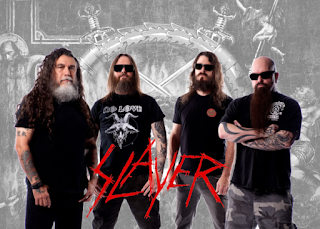 | |
| He's in there, somewhere. |
The first time I heard Marilyn Manson was on Beavis and Butthead so internet usage wasn't widespread, it was mostly limited to message boards and IRC and if you didn't know people who were into the extreme underground metal of the time, what you were exposed to was pretty limited, especially as a teenager living in bumfuck redneck Central Virginia. Which is to say that while bands like Cannibal Corpse or more likely Pantera were much heavier and much more likely to feature on a mixtape cassette that I'd be listening to at the time, Marilyn Manson was intriguing for a pair of reasons.
The first and most obvious was that their first album followed in the wake of Nine Inch Nails' "The Downward Spiral", which for most younger rock fans at the time was the first real exposure to industrial influenced music with heavy doses of samples, drum treatments, and just awkward unconventional music that was a challenge to listen to. (This is still a great record, btw.) Hearing Manson's first album "Portrait of an American Family", its not really surprising that NIN mastermind Trent Reznor was quite involved in the band's music from a purely aural aspect.
The other reason was that in terms of aesthetic and lyrical content there was no other commercially viable artist who was so transgressive or anti-establishment. In retrospect, its very easy to see how the band had an image cobbled together from Alice Cooper, Ziggy Stardust, and Gwar. At the same time, thinking back to the Invisible Oranges article, it's not hard to see how the content of the band in those early years was very much a product of their environment, which just happened to be Florida. Land of retirees living in cookie cutter suburbs, Disney World, and untold numbers of creepy evangelicals.
 | |
| You know, you are a product of your environment. |
(Interesting observation; At The Gates basically ripped off the same chord progression as performed by Marilyn Manson for the main guitar harmony for "Blinded by Fear" and nobody hardly says a word.)
So why did it lose appeal to me and why do I think he generally fell off?
For starters, Marilyn Manson musically suffered greatly after those first 2 albums when they disassociated with Trent Reznor. The band tried to go for a more creepy, kitschy industrial aesthetic. It simply sucked if your musical inclination was metal rather than "alternative." From a shock rock perspective, given how extreme Manson's imagery and theatrics were, it didn't really leave many boundaries left to cross. Well, unless you were GG Allin and willing to mutilate yourself and defecate on stage. At that point I'm not sure it's shocking or just kinda gross for most fans. Manson's act, so dependent on shock value, basically played all of their cards at the beginning. Once it wasn't shocking anymore, what's left?
 |
| Way more extreme than basically anyone who ever live could hope to be. |
At the same time, in 2 short years my own musical experiences had expanded greatly as I discovered internet forums, met upperclassmen, and discovered black metal. Like Manson, 2nd wave black metal was highly theatrical and demonstrative. It challenged social norms. More importantly, for many of the musicians involved, black metal was no act. Churches were burned. People were murdered. No fucks were given. Musically, though the bands had similar aural elements, there were many of them releasing new and exciting albums on a regular basis. Going to the local Plan 9 Records and buying Rotting Christ's "Thy Might Contract" one month, then Emperor's "Anthems To The Welkin At Dusk" the next, before discovering Satyricon's "Nemesis Divina" a week later...reading about the mythology behind Mayhem and Dissection. It felt more serious, more "real." Some dude in a thong groaning to a programmed beat just wasn't nearly as interesting.
 |
| That wss actually how Norwegian black metal bands did their photo shoots. Their vocalists blow their brains out. Sorry for the mess. |
So where does Marilyn Manson fit into metal history and into the scene today? I think that despite the band's commercial success, they are a relatively minor footnote most remembered for the fact that the two dorks that shot up Columbine High School in 1999 were perceived to be fans of the band. Perhaps also remembered for breaking down the last taboos in theatrical musical performance. I don't think anything from "Mechanical Animals" onward is really remembered; perhaps for Manson's androgynous appearance but not for the music. The band continues to release music that's mostly forgotten after it comes out, and tours large clubs to perform to 30 somethings that want to reconnect with a part of their teenage years by hearing songs from the first 2 albums.
 | |
| Marilyn Manson has basically become like Tom Petty (except for the being dead part); soulless bland dad rock for adults who grew up as poorly adjusted teenagers in the 1990's. |
While typing this up, I went on YouTube and revisited some of Marilyn Manson's music to see if any of it at all still had a hook or caught my ear. Truth is, very little of it does. But the song "Lunchbox" is kinda revealing in retrospect. It's refrain "I want to be a rock n' roll star so nobody fucks with me" pretty much says what it was all about. It was never about creating music. It was always about rock stardom for Marilyn Manson, so while the band certainly consumed a lot of drugs and engaged in debacherous sexual behavior and made a pile of money off of their antics, when you pick at the corpse of the music they left behind, there's not a lot of meat there. There never was.


